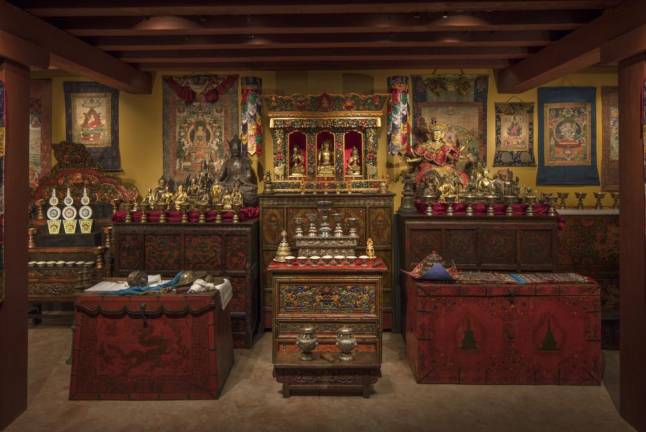Focusing on Art, Alleviating Stress
The Rubin Museum's online offerings pair works of art with guided meditations




Art has the ability to speak directly to the spirit. In ways that are myriad and mysterious, the spirit responds. That's why people have been creating, considering and cherishing art for as long as there have been people.
Works of art can take us away from the moment, bring it to focus, or both. With today's realities, it's never been more important to access our cultural treasures, even as it's never been more difficult. The solace and balm of beauty, the wisdom and understanding expressed in art, and the power of the mind, when they come together, present many routes for coping and, so importantly now, hoping.
While art museums around the world have made their works available online, New York's Rubin Museum is offering something even more with their "Rubin Care Package." To stay in touch with and support the public, they're making available guided meditations that pair works of art as a method to approach thoughts and emotions. The museum's website and a newly launched series on Instagram is filled with multimedia resources and reproductions of masterpieces that are all about touching the spirit.
Opening the Mind
Experiencing fewer things doesn't necessarily mean experiencing less. Approaching a work of art slowly and with attention often yields more than walking through gallery after gallery. Whether in person or virtually, art rewards careful observation. As you browse, consider what draws you to a work. How does it make you feel? If you immediately like it, why? If not, why? Is there any aspect you like? Subject matter? Color? Line? Is that enough? The more you ask, the more you're likely to find out about not just the piece, but your own thoughts on art. Who made the object, when and why, can lead to deeper revelations, and the collection highlights offer information on 3,800 works spanning 1,500 years. Many of the museum's works come from the Buddhist and Hindu traditions, and were created expressly for the purpose of opening the mind.
https://rubinmuseum.org/collection/search
Pairing art works with recordings from noted meditation teachers, a collection of over 200 podcasts are online. Each lasts about 20 minutes. Tracy Cochran, editorial director of Parabola, a magazine focused on wisdom traditions, is one of the presenters. Among the works she discusses is a gilded stature of the Protector Begtse Chen from Mongolia. She describes his coat of chain mail and his military regalia as weapons against "ego-centered conceptions" before guiding listeners through exercises to control breath, and direct thought and emotions.
https://rubinmuseum.org/mediacenter/category/mindfulness-meditation-podcast
"Take One Breath"
Shorter meditations from "The Rubin Daily Offering" featured Sharon Salzburg broadcasting from her home last week, and were presented via the museum's IGTV channel. With the initial lesson, "Take One Breath," and subjects like "Self-Love" and "Love for All Beings" they address releasing anxious thoughts. Upcoming features will include insights from Dr. Tawni Tidwell, a biocultural anthropologist and doctor of Tibetan medicine (presented in conjunction with the University of Wisconsin-Madison) There are four more weeks of new programs scheduled, and, according to Sandrine Millet, communications manager, they may be extended beyond that.
https://www.instagram.com/rubinmuseum/channel/?hl=en
The Tibetan Buddhist Shrine Room, the museum's most popular exhibit, is being featured with 2 hours of meditative chanting by Buddhist monks of Maitri Vihar at Swayambhu in Kathmandu, Nepal, and nuns from theTibetan Nuns Project, in India. It's available to be streamed, the museum states, as "a refuge in times of stress, anxiety, and uncertainty."
https://rubinmuseum.org/mediacenter/tibetan-buddhist-shrine-room-video
If the idea taking a deep breath, relaxing, and pausing your thoughts through meditation appeals, there are countless approaches. Some involve art, but not all. A quick Google search for "online mindfulness meditation" yields 45 million results and pages and pages of videos and exercises for releasing anxiety and clearing the mind. California's Monterey Bay Aquarium, also temporarily closed to visitors, offers "Morning MeditOceans." Their floating jellyfish, slowly diving sea turtles, waves and bubbles, otters and octopi, have attracted tens of thousands of viewers.
https://www.montereybayaquarium.org/stories/guided-mindfulness-meditations
These days, we should use all the relief and support found in meditation, prayer, nature, music or art. As John Lennon reminded us, "Whatever gets you to the light, It's all right."